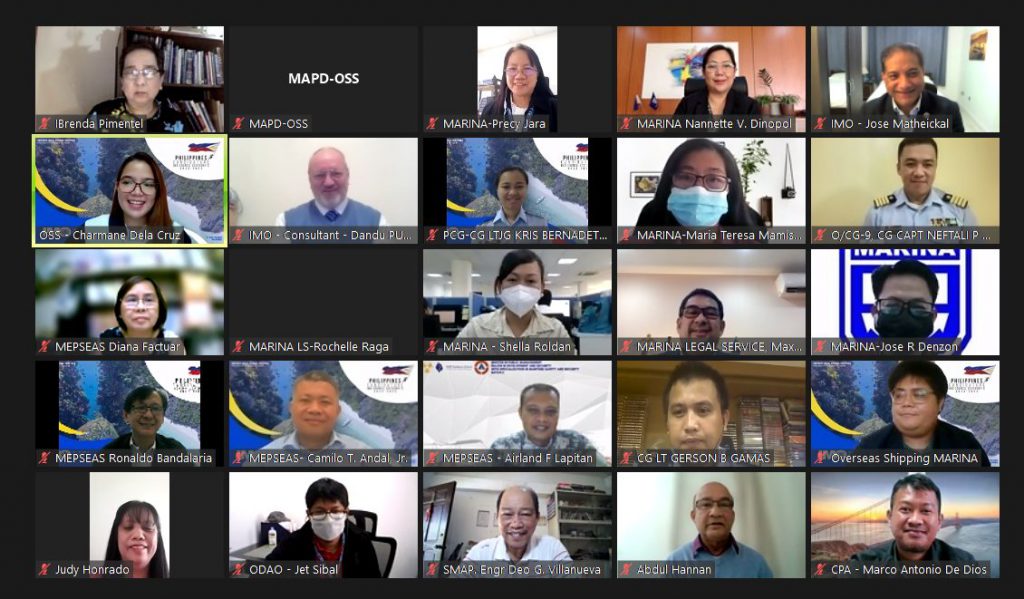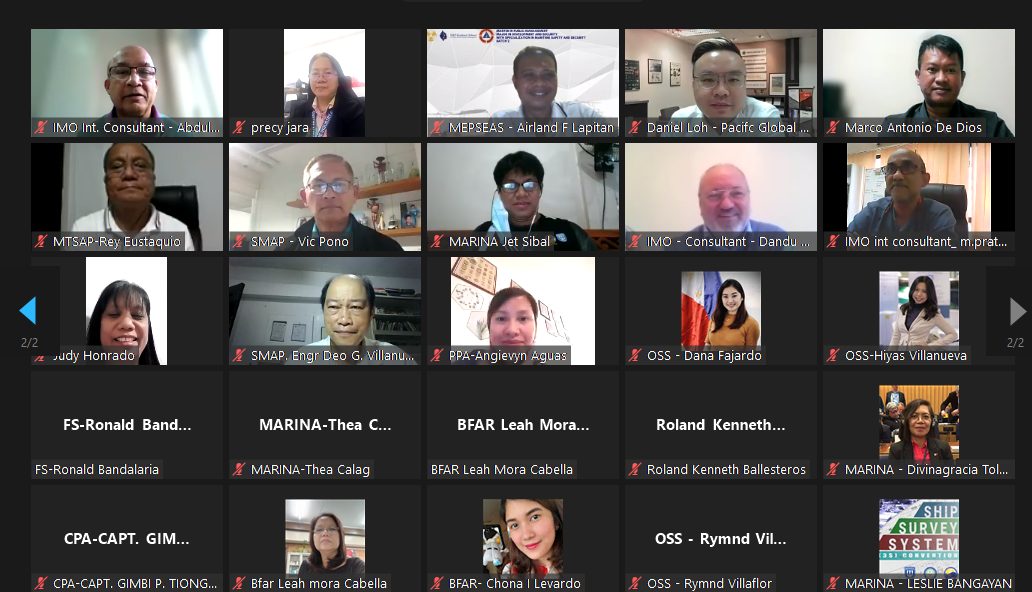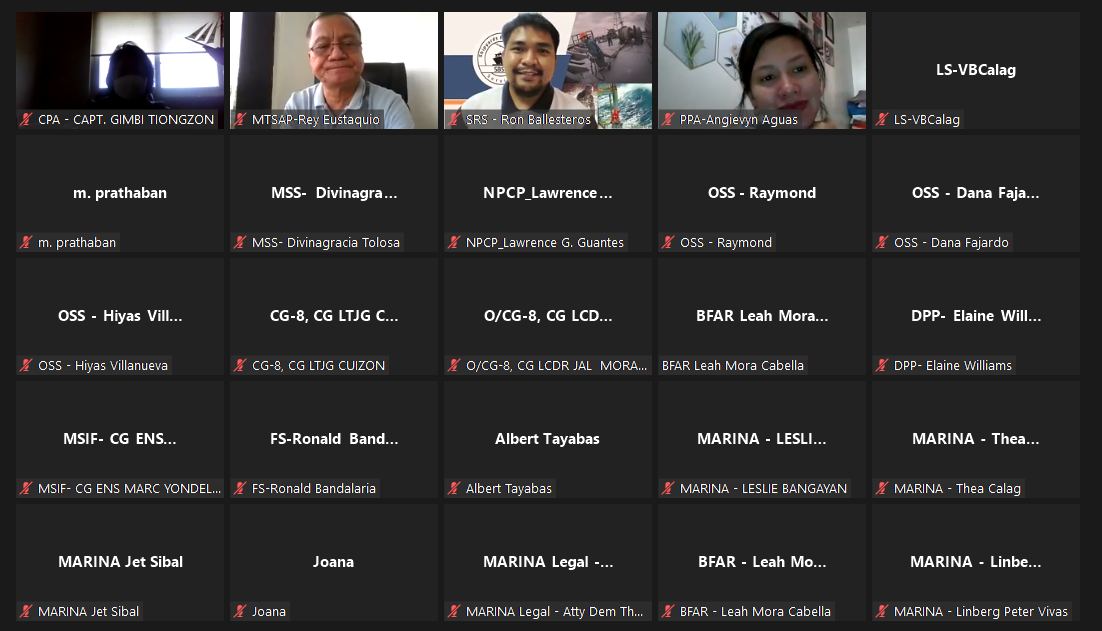Consistent with the country’s commitment as a responsible party to the Marine Environment Protection of the South-East Asian Seas (MEPSEAS) Project, the Maritime Industry Authority (MARINA), in collaboration with the Philippine Coast Guard (PCG), and in cooperation with the International Maritime Organization (IMO), strengthened Philippine mechanism for the effective implementation of the International Convention on the Control of Harmful Anti-fouling Systems on Ships (AFS Convention) and International Convention for the Control and Management of Ships’ Ballast Water and Sediments, 2004 (BWM Convention), through the conduct of Compliance Monitoring and Enforcement (CME) National Workshop from 23 to 26 November 2021 via video conferencing.
Commenced by the MARINA Deputy Administrator for Operations, Engr. Nannette Z. Villamor-Dinopol, the 4-day CME National Workshop aims to present the National Guidance Document (NGD) to the concerned government agencies and stakeholders for them to share their views and insights, gather valuable comments/inputs and resolve gaps and disparities for the effective implementation of the said two (2) IMO Conventions.
“The draft National Guidance Document is a result of the CME Remote Programming Exercise which was attended by the three (3) CME National Experts from the Philippines. The said document will serve as a basis of the Flag State implementation and Port State Control administrative procedures for the AFS and BWM Conventions,” Engr. Dinopol highlighted.
Dr. Jose Matheickal, Head of the Department of Partnerships and Projects of the IMO, expressed his gratitude to the Philippines as the latter found the time and resources to move forward towards all of the objectives of the MEPSEAS Project to reduce the modern impact of shipping in the ASEAN Region in spite of the restrictions imposed by the COVID-19 pandemic.
“We wish to congratulate the Philippines for all the progress made under the MEPSEAS Project. You have achieved a number of milestones in the first phase, ratified Conventions and now in the second phase, you are progressing very well in developing the enforcement guidelines aspects and eventually to start implementing the Conventions,” Dr. Matheickal said.
The CME Workshop was spearheaded by the CME International Consultant, CME National Experts, resource persons from the Philippine maritime administration and private stakeholders.
Mr. Abdul Hannan, CME International Consultant, gave a short introduction and the salient features of the two (2) IMO Conventions.
CME National Expert, Engr. Ronaldo P. Bandalaria of the MARINA – Franchising Service, introduced the draft NGD to the participants and presented its purpose and contents. He likewise discussed the legislative process needed to give full and complete effect to the provisions of the two IMO Conventions. He also presented the provisions for offenses that may be committed under the AFS Convention and the corresponding fines and penalties for violators as well as the minimum qualification, experience and training necessary for Flag State Surveyor and Port State Control inspector.
On the other hand, CME National Expert, CDR Airland F Lapitan of the Philippine Coast Guard (PCG), discussed about the requirements and legislative checklist for BWM Convention which is necessary to be incorporated in the drafting of enabling legislation or in secondary law or its technical regulations.
CDR Lapitan also talked about the administrative procedures to implement the provisions of the BWM Convention which includes fees, communication of information, delegation of authority, survey procedures, dissemination of regulations, record keeping and issuance of certificates and exemptions. He also shared his knowledge regarding the enforcement measures to be taken by the Port State Control officers/flag compliance officers for non-compliance of ships/entities on the enforcement measures.
Moreover, another CME National Expert, Engr. Camilo T. Andal, Jr., explained the legislation and regulations for effective Port State Control and Flag State implementation for AFS Convention. Engr. Andal also added in his discussion the administrative procedures to implement the provisions of the AFS Convention as well as its enforcement measures.
Meanwhile, Atty. Maximo I. Bañares, Director of the MARINA Legal Service, informed the participants about the status of the Philippine draft bill on AFS and BWM Conventions and the existing regulations pertaining to the said IMO Conventions.
The Director of the Operations Support within the South East Asia Region and Offshore Manager Philippines of the Bureau Veritas, Mr. Jimmy Ye Ji, discussed about the existing procedures and compliance of Recognized Organizations relative to the delegated function on survey and certification of the Philippine-registered ships engaged on international voyages under the AFS and BWM Conventions.
Further, compliance and challenges to the two IMO Conventions encountered by the shipowners, Port State Control, Ballast Water Treatment Plant (BWTP) suppliers and manufacturers, and seafarers were presented by Mr. Dario R. Alampay Jr., President of the Filipino Shipowners Association, CDR Michael B Andag of the PCG, Mr. Daniel Loh of the Pacific Ship’s Plants and Industries Pte. Ltd., and Capt. Enrico Oliva Santos of the MARINA, respectively.
In continuation of the discussion, Engr. Maria Teresa D. Mamisao of the MARINA Shipyards Regulation Service talked about the MARINA Circular Nos. 2020-04 or the Rules and Regulations on the Application of Anti-Fouling Paints and Systems in Ships in Compliance to the International Convention on the Control of Harmful Anti-Fouling Systems in Ships (AFS Convention) and 2020-05 or the Rules and Regulations for the Control and Management of Ships’ Ballast Water and Sediments in Compliance to Ballast Water Management Convention.
The CME National Workshop was concluded by the Deputy Commandant for Operations of the PCG, VAdm Eduardo D Fabricante.
“Despite the challenges brought about by the COVID-19 pandemic on how we undertake the significant activities like this, I am positive and hopeful that this undertaking would continuously strengthen the cooperation and collaboration of the concerned maritime agencies and stakeholders towards our goal for a better and innovative Philippine maritime industry,” VAdm Fabricante said.
The Philippines is one of the Lead Partnering Country (LPC) in the MEPSEAS Project with the MARINA as the National Focal Point (NFP). The said project is now on its fourth year (2021) of execution. Among the four (4) IMO Conventions under the MEPSEAS Project, the Philippines had identified the International Convention on the Control of Harmful Anti-fouling Systems on Ships (AFS) and International Convention for the Control and Management of Ships’ Ballast Water and Sediments (BWM) as its priority IMO Conventions.






